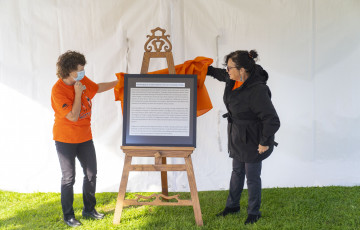This section provides information on keeping your preschooler healthy (children aged three to five).
- Nutritious meals and snacks based on the Canada Health Guide will help preschool children develop healthy eating habits and provide nutrients needed for healthy growth.
- Preschoolers need to exercise their large muscles often. Give them time and space for activities like running, climbing, jumping, dancing, and swimming.
- Preschoolers are ready to develop fine motor skills like holding a crayon, using scissors, zipping zippers, doing up buttons, and tying laces. Age-appropriate toys and activities will help them practice these skills.
- 育儿preschool children involves caring for their social and emotional development.
- Regular check-ups with your family doctor and public health nurse are important for ensuring your preschooler’s good health and development.Immunizations, as well as vision, speech, and hearing tests should be done before your child enters school.
View PDF of slides Healthy Babies and Children, Island Health May 2018
Nutrition
Healthy food is essential for growing children but, like you, your child’s relationship to food is not just nutritional. Choosing, preparing, and enjoying food is often a family affair. Many children show their first signs of independence at mealtime.
You can help your preschooler develop healthy eating habits and attitudes toward food
- provide your preschooler with a healthy range of foods following recommendations in theCanada Health Guide
- preschool children need routines
- regular and frequent meal and snack times give them the nutrition they need and help them develop healthy eating habits
- allow your preschooler to make decisions about food
- offer healthy choices and allow them to decide how much they need to eat
- model healthy eating habits, a healthy body weight and positive self-image for your child
- respect the food preferences of your child, but also encourage her to try new things to develop their sense of taste and acceptance and enjoyment of new foods
- avoid using food to bribe, comfort, or control your child
育儿
As your child grows, her need for your guidance expands and becomes more complex. Like babies, preschoolers need plenty of physical affection, comfort, and security. They also need your help to start developing social and emotional maturity.
学习about child development will give you reasonable expectations for your child and help you find ways to nurture healthy development.
Every child-parent relationship is different. Consider how your child’s temperament and your own parenting style interact.
Preschoolers respond best when parents praise positive behaviour and give consistent, reasonable consequences for negative behaviour. Research continues to show that even light physical discipline harms a child’s mental and emotional health.
Nurturing your child includes supporting learning, as well as the development of social skills and emotional changes.
Emotional Changes
Between the ages of three to five, preschool children are ready to take small steps toward emotional maturity. Parents can help nurture their preschooler’s budding self-control, stress-handling skills, and confidence. Keep in mind these skills are brand new so your expectations should be reasonable.
- at the end of your child's second year, typically the year of the tantrum, your child will start to be able to control her impulses
- over the next few years, you can help by encouraging your preschooler to take turns, giving routines they can understand and follow, involving them in family decision-making and problem-solving and teaching to control aggressive behaviour
- 培养宝宝y和舒缓的关注ears set the foundation for a preschooler’s ability to handle normal stress and anxiety
- continue to respond quickly and positively to your child’s needs for affection, comfort and security
- preschoolers’ new physical and social competence make them eager to participate in the grown-up world
- support your child’s increasing confidence by letting them handle new situations and try new things
学习
You are your child’s first teacher. By the time he is a preschooler, you’ve already taught him to walk and speak, two of the most difficult things a child will ever learn. You do not need a certificate in education to continue teaching your preschooler new things.
- encourage, support and praise curiosity, imagination, and exploration
- these will fuel your child’s excitement for learning for the rest of her life
- take time to enrich activities like baking, repairing the home and walks in your neighbourhood by teaching your child what you know
- every new day provides hundreds of opportunities for your child to develop vocabulary, problem-solving skills and number skills
- read with your child
- the single most important thing a parent can do to ensure a child’s healthy intellectual development is to read to them every day
- read picture books, instructions, signs, cereal boxes, comics, newspapers and menus
- visit the library in your community often so your child has new, interesting things to read
- use play time to help preschoolers develop the skills they will need to enter school
- age-appropriate activities and toys build fine motor skills like holding a crayon, using scissors, zipping, buttoning and tying laces
Social Skills
The preschool years mark the beginning of your child’s move from a “me-centred” universe into awareness of the world of others. They need you to nurture healthy social skills and encourage positive interactions with other people.
- language and communication skills will form the basis of your child’s relationships with other people
- help your preschooler develop social skills simply by talking with him and actively listening to them
- encourage conversations through storytelling and asking open-ended questions
- preschool children are now learning to control their impulses - this is crucial for the development of age-appropriate social skills
- praise your child when she shares and waits their turn
- encourage your child to develop empathy for others by using teaching and explanation to discipline
- help them take another person’s perspective and feel concern for a victim
- find organized and unorganized activities where your preschooler can interact with other children







